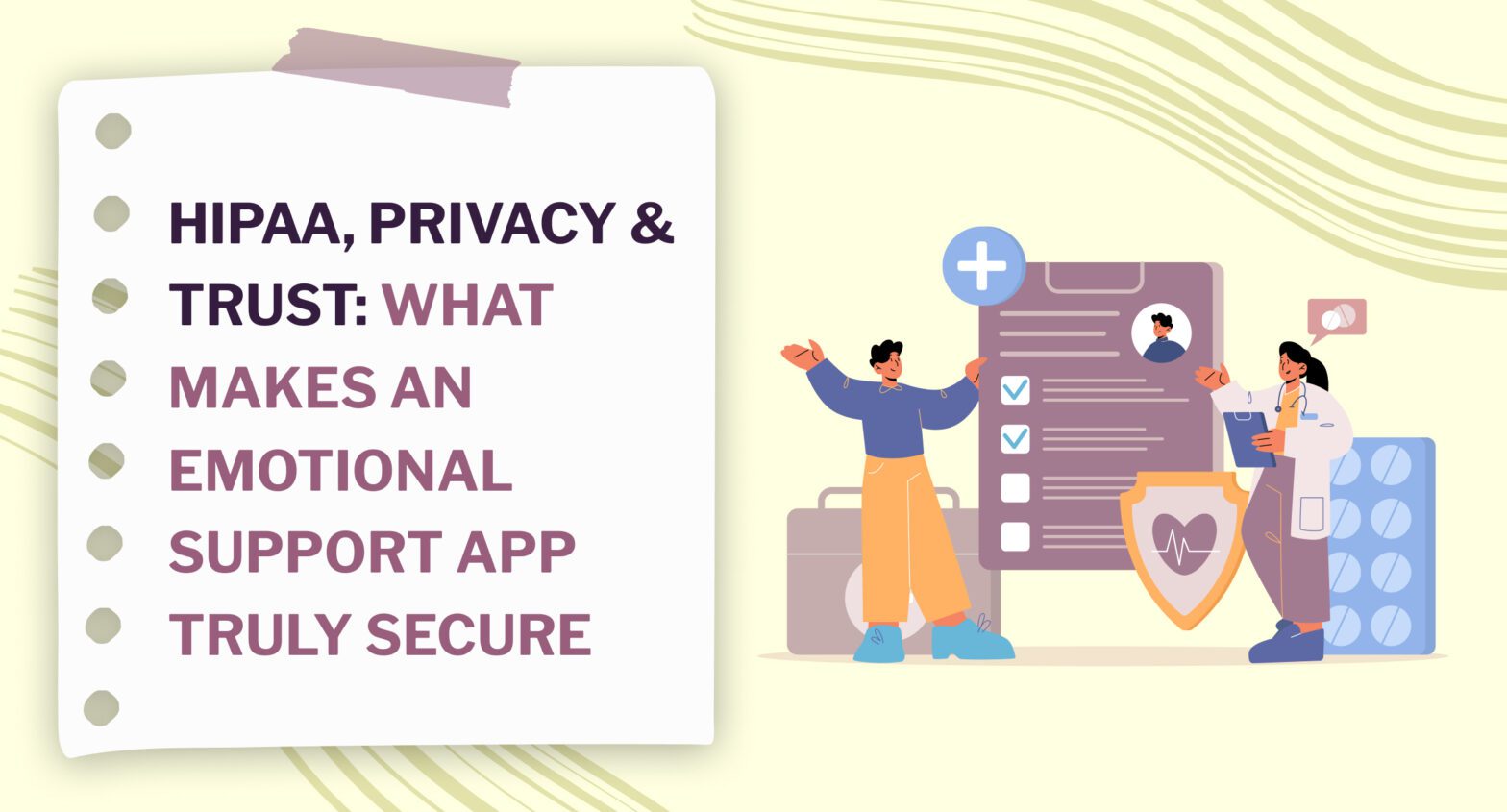Emotional support apps are becoming a buzzword nowadays. More people are trying such apps and sharing vulnerable information about themselves on the apps. Sensitive conversations on the internet require more than just a few checkboxes of safety features. Because without security, even the most advanced AI and designing can fail.
That’s where compliance like HIPAA comes in the picture. It gives strong privacy frameworks and ethical responsibilities for developing and running a mental wellness app. In this blog, we will explore the role of HIPAA in mental health apps and it’s impact on the industry.
- The role of HIPAA in mental health tech
- Building trust through data privacy
- Transparent data policies and user consent
- Going beyond HIPAA with global standards
- Balancing security with user experience
- Community trust and ethical responsibility
The Role of HIPAA in Mental Health Tech
HIPAA stands for Health Insurance Portability and Accountability Act. It is an important compliance that sets the gold standards for protecting sensitive data of patients also known as Protected Health Information (PHI). This compliance include physical, administrative, and technical safeguards to keep patient’s data safe. And when it comes to emotional support platforms, compliance is the foundation.
For emotional and mental health support apps and platforms, HIPAA complainace means:
- Confidentiality: User data cannot be disclosed without consent.
- Integrity: Data must remain accurate and unaltered.
- Availability: Information must be accessible to authorized users when needed.
The important thing to notice is that there is not need to be HIPAA-compliant if the app is more like peer-support community. However, if the app offers medical tools and professional help, data privacy is crucial. Users will easily understand the difference between an app that takes data privacy seriously and the one that doesn’t. HIPAA will build credibility for the platform and will help gain trust of the users on the early stage.
Building Trust Through Data Privacy
Building trust on a platform where users have to share the vulnerable details about their life is not easy. Vague promises and usual data security won’t work here. Here’s what the app should have instead:
- End-to-End Encryption (E2EE): Not only third party apps, but even the platform itself should not have any visibility into the privata data exchanges of users. It includes chat, voice call, and video sessions. Only the involved participants should be able to access it.
- Secure Authentication: Authentication is as important as encryption. Biometric logins, two-factor authentication (2FA), and strong access control helps in authentication that is not easily compromised.
- Anonymity Options: This is very useful because there are many users who would like to use the app without sharing their identity. Allowing anonymous profiles can help more people in an easy, secure way.
- Regular Audits & Testing: This should be a part of the routine. From in-built features to third-party apps, everything should be checked and audited on regular intervals.
Our experts at Nyusoft believes that these safety features are trust signals. Because when a user can log in without any glitch, share a conversation without hesitation, or simply see these encryption badges and simple consent prompts, the app earns credibility.
Transparent Data Policies & User Consent
The next step to increase credibility is a solid privacy policy. Often overlooked, it plays a vital role in reassuring users by explaining how their data is collected, stored. A privacy policy should have:
- Clear Language: Instead of jargon or unnecessary pointers, explain what data is being collected, why, and for how long in simple language.
- User Consent as Control: Allow users to decide if they want their conversations anonymized for researc or not. If they’re comfortable receiving AI-driven suggestions, or if they’d like to opt out.
- Data Ownership: Make it explicit that the user owns their story, not the platform.
Transparency is not only about compliance lie HIPAA, it is also about empathy. When users know what is happening with their data behind the scenes, they feel respected and valued.
Also Read: The Tech Stack We Use to Build AI-Driven, Real-Time Emotional Support Platforms
Beyond HIPAA: Global Standards of Security
HIPAA is an excellent compliance but is limited to the US only. Whereas the emotional support platforms are not bound by geography. Here are some compliances that works similar to the HIPAA:
- GDPR (Europe): Requires explicit consent, right to data access, and “right to be forgotten.”
- PIPEDA(Canada): Personal Information Protection and Electronic Documents Act control how private organizations handle personal health information of patients in Canada.
- Australian Privacy Principles(Australia): This compliance have special safeguards for sensitive health information in Australia.
- ISO 27001: Provides a global framework for information security management. It is not a compliance, but a certificate that any organization can follow to gain credibility and trust.
The privacy-first architecture should be designed for the global user base. Moreover, this will also make a strong impression to build up trust from users. By aligning with multiple frameworks from the start, apps show that protecting user data isn’t tied to legal obligations alone, it’s a global responsibility.
Balancing Security with User Experience
A user is signing in on the platform with the intention of getting emotional support as soon as possible. Do not trap them into endless forms, complicated verification proess, or repeated logins. On the other hand, too little friction can create risk. Here is Nyusoft approved way to incorporate safety in design that feels invisible to the users:
- Seamless biometric logins (fingerprint, FaceID) instead of long passwords.
- Background encryption processes that don’t interrupt chats.
- Privacy prompts are explained in context rather than hidden in settings.
Let’s not create complicated login experiences. Keep it safe and welcoming while making sure there is no compromise on the security of user’s data.
Community Trust & Ethical Responsibility
Apart from the legal checkboxes and compliances, there is a social aspect of being responsible. Emotional and mental health support apps are driven by communities where users connect, listen, ans share.
Here are some things to keep in mind to maintain ethical responsibility of your community of users:
- AI Moderation: AI algorithms can locate harmful language and suspicious online behaviours. This helps in preventing harassment, spread of false information, or concerning communications.
- No Exploitation for Ads: User data and including sensitive conversations should never used for marketing, advertising, or monetization.
- Respecting Peer Support Dynamics: Many emotional support apps works as peer-to-peer engagement platforms and not as a professional therapists. Make it clear for the users and this honesty will give a strong foundation to your platform.
By framing the app as a supportive, ethical, and secure environment, developers build something more valuable than compliance; they build belonging.
Conclusion
Security and trust are the backbones of any emotional support platform. If users feel secure, they will share their fears, anxieties, and stories without hesitation. HIPAA provides a strong legal foundation, global standards raise the bar, and everyday choices make privacy real.
But most importantly, trust goes beyond regulation. It’s earned through consistent transparency, ethical responsibility, and genuine respect for users’ emotional journeys.
In the end, the apps that will thrive are the ones that understand: when it comes to emotional support, safety isn’t optional, it’s everything.



